Eid mubarak! As the Blessed Month of Ramadan ends and we enter the Blessed Month of Shawwal, We ask Allah to accept our fast and our worship and good deeds. May Allah purify our sins and shower His blessings and mercy upon us all.
Donate and support the Oppressed
IHRC support victims of oppression around the world including Palestine, Nigeria, Yemen and the Rohingyan refugees in Bangladesh. We have a number of campaigns that you might be interested in. To donate, please click here.
Below are some of the books we currently have in stock:
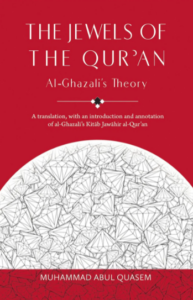 The Jewels of the Qur’an; Al-Ghazali’s Theory – Muhammad Abul Quasem
The Jewels of the Qur’an; Al-Ghazali’s Theory – Muhammad Abul Quasem
This work, a translation of Imam al-Ghazali’s ‘Kitab Jawahir al-Qur’an’, contains his views on several broad problems relating to the study of the Qur’an, in which various parts of the Qur’an are compared to various types of valuables, such as jewels, pearls, rubies, red brimstones, corundums, etc. The book also carries translation of over 1500 verses which al-Ghazali calls the jewels and the pearls of the Qur’an.
This classification is unprecedented in the history of Qur’anic studies, presented here in free-flowing modern English which makes the work scholarly and enjoyable.
Tafsīr al-ʿAyyāshī is a fourth/tenth century commentary of the Qurʾan by the Shīʿī Imāmī exegete Abū al-Naḍr Muḥammad b. Masʿūd al-ʿAyyāshī (d. 320/932). Composed during the period of the Twelfth Imam’s minor occultation (al-ghaybat al-ṣughrā) it counts as one of the earliest surviving commentaries from the early phase of Imāmī Shīʿism.
Comprising several thousand traditions gathered from the Prophet Muḥammad and his household (ahl al-bayt) al-ʿAyyāshī’s tafsīr provides an overall unique Shīʿī conception of Islamic sacred history as well as an early representation of Imāmī exegesis and commentary on the outer and inner meanings of the Qurʾan, the sacred scripture of Islam. This bilingual Arabic-English edition of al-ʿAyyāshī’s tafsīr provides a complete translation in three volumes of a key text from the classical period of Imāmī Shīʿism and offers an indispensable resource for specialists and non-specialists alike interested in the history of Qurʾanic exegesis. This multivolume translation includes a detailed introduction by Professor Meir Bar-Asher, who has written extensively on the history of Imāmī exegesis, as well as multiple indices that enable the reader to engage with the text as an ongoing tool for study and research.
Click below to purchase the other volumes:
Abrogation in the Qur’an and Islamic Law: A Critical Study of the Concept of Naskh and its Impact – Louay Fatoohi
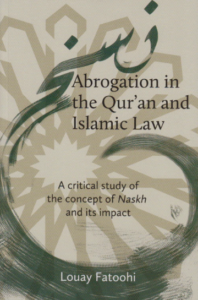 This is the only book in English that is dedicated to the study of abrogation.
This is the only book in English that is dedicated to the study of abrogation.
Starting with the earliest available sources on abrogation through other primary sources and major works and up to the most recent publications, this book traces the development of the concept of abrogation from its most basic form to the complex and multi-faceted doctrine it has become.
The book shows what specific problems the three modes of abrogation were introduced to solve and how this concept has shaped Islamic law. The book also critiques the role of abrogation in rationalizing the view that not all of the Qur’anic revelation has survived in the “muṣḥaf” i.e. the written record of the Qur’an. This role makes understanding abrogation an essential prerequisite for studying the history of the Qur’anic text.
In addition to analyzing the conceptual and documentary bases of each mode of abrogation, the book takes a practical approach by examining specific abrogation claims, including those related to the stoning penalty, law on fighting non-Muslims, and women’s rights law. The theoretical conclusions of the book are thus backed up by data of how abrogation has actually been used.
The book is suitable as a reference work on abrogation for both the expert and more general reader.
My First Book of Islamic Months: A Fold-Out, Lift-The-Flap Book – Hajera Memon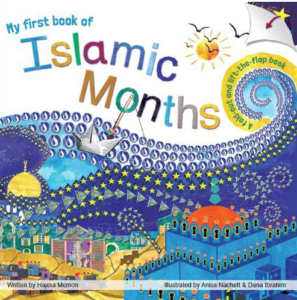
Teach your child the names of the months in Arabic and English. Discover special facts as you lift each flap! Some of the months were named after the weather. Can you tell? Fold out the pages of the book to create a colourful display suitable for homes, classrooms and libraries.
The perfect book to introduce your child to numbers and explore historical Islamic events in a unique and imaginative way. A great gift for the whole family to enjoy together, all year round.
Children learn best about their religion whilst playing. Therefore Salaam Art created the book “The 25 Prophets in the Quran”, a story, art and crafts book for the entire family. The book is filled with beautiful stories about the prophets, inspired by ayaat in the Quran.
The book offers a number of craft activities to do together with the children; reading, drawing, painting, illustrating, calligraphy and making geometric figures together.
To carry out the craft activities, you make use of materials such as ecoline, clay, fabric, pencils, brushes, needle and thread. But you can also be creative with natural materials you already have at home or in class, like a feather or a stone, or even waste materials.
The tafsīr of al-Qurṭubī is perhaps one of the most compendious of them all and is certainly among the most famous.
As its title, al-Jāmi‘ li Aḥkām al-Qur’ān – The General Judgments of the Qur’an, suggests, its main focus is on the rulings and judgments to be found in the Qur’ān.
However, in the course of doing that, al-Qurṭubī examines all the relevant sciences necessary, such as the ḥadīth pertaining to the āyahs, events in the sīrah, what the Companions, their Followers and other noted people of knowledge said about the āyahs, essential aspects of Arabic etymology, syntax and usage, copiously illustrated by examples, and much more.
In this volume, the author examines the Fātiḥah in great depth, and then works through the first juz’ (two ḥizbs), stopping to examine linguistic matters, aḥkām/judgments in greater detail, covering, for example, īmān, establishment of the ṣalāt, zakāt, hypocrisy, the Tribe of Israel, the creation of Adam and Ḥawwā’, caliphate, abrogation, and including the pivotal story of the sacrifice of the cow by the Tribe of Israel.
Click below to purchase the other volumes:
Introduction
Volume 2
Volume 3
Volume 4
Volume 5
Volume 6


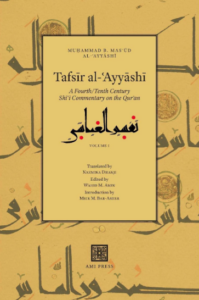
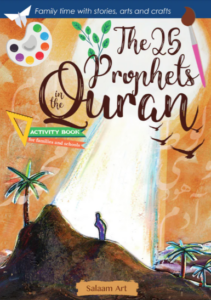
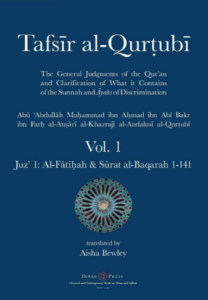 Tafsir al-Qurtubi – Vol. 1: Juz’ 1: Al-Fātiḥah & Sūrat al-Baqarah 1-141 – Abu ‘Abdullah Muhammad Al-Qurtubi (Author), Abdalhaqq Bewley (Editor), Aisha Abdurrahman Bewley (Translator)
Tafsir al-Qurtubi – Vol. 1: Juz’ 1: Al-Fātiḥah & Sūrat al-Baqarah 1-141 – Abu ‘Abdullah Muhammad Al-Qurtubi (Author), Abdalhaqq Bewley (Editor), Aisha Abdurrahman Bewley (Translator)

